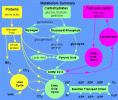You guys must be getting sick of my preaching by now... Lol
I'd go back to 280 or 250g of carbs again and stay with the IF with ALL your carbs post workout... None during the day. And also, no low glycemic carbs, especially close to bed time. You do not want your body still processing carbs all night long!
I'd also be targeting at least 3 liters of water a day and caffeine... 400 to 600mg 1hr pre workout, 400mg mid day.
From what I've read, and this is my opinion, and everyone is gonna have their own, large carbs for breakfast are making you fat. When you wake up, you're naturally hungry... But this is when your insulin sensitivity is highest. Meaning your body is gonna burn what it needs (not much, you just woke up!!) and shuttle off excess carbs into your fats cells.... And do this efficiently because of your sensitivity. Late afternoon, sensitivity wanes...
After workout, your muscles are ready for uptake, and will take priority over your fat cells. Feed them!
Remember, this feeding fuels the next days workout...this is why I prefer A/B splits and workout 4 to 6 times a week.
Have a coffee and go to work. Have another coffee... For late lunch, a cup of cottage cheese, small amount of almonds, some fish oil... I also sip on green tea all morning and afternoon.
Hold off your workouts until 4pm...have 20g protein powder with a table spoon of coconut milk with your caffeine 1 hr before workout. After workout, pound down those carbs! Then get your protein... And snack (protein rich) til bedtime to get your calories.
Do this for the rest of the month and tell us how it's going.
I'd go back to 280 or 250g of carbs again and stay with the IF with ALL your carbs post workout... None during the day. And also, no low glycemic carbs, especially close to bed time. You do not want your body still processing carbs all night long!
I'd also be targeting at least 3 liters of water a day and caffeine... 400 to 600mg 1hr pre workout, 400mg mid day.
From what I've read, and this is my opinion, and everyone is gonna have their own, large carbs for breakfast are making you fat. When you wake up, you're naturally hungry... But this is when your insulin sensitivity is highest. Meaning your body is gonna burn what it needs (not much, you just woke up!!) and shuttle off excess carbs into your fats cells.... And do this efficiently because of your sensitivity. Late afternoon, sensitivity wanes...
After workout, your muscles are ready for uptake, and will take priority over your fat cells. Feed them!
Remember, this feeding fuels the next days workout...this is why I prefer A/B splits and workout 4 to 6 times a week.
Have a coffee and go to work. Have another coffee... For late lunch, a cup of cottage cheese, small amount of almonds, some fish oil... I also sip on green tea all morning and afternoon.
Hold off your workouts until 4pm...have 20g protein powder with a table spoon of coconut milk with your caffeine 1 hr before workout. After workout, pound down those carbs! Then get your protein... And snack (protein rich) til bedtime to get your calories.
Do this for the rest of the month and tell us how it's going.
On the intermittent fasting I am currently consuming most of my carbs after workout or first meal of the day. Carbs on first meal are 150g. 50g on the last meal. The problem I am also facing is that I am also rapidly losing strength on such low calories. It's like the calories are so low that I am losing strength but still not low enough to be losing fat. Going lower is difficult and I imagine will probably affect my strength even more.
With regard to timing carbs I was also doing IF when bulking consuming about 280g carbs on my first meal and 80g on my second. It still resulted in me gaining alot of fat.

